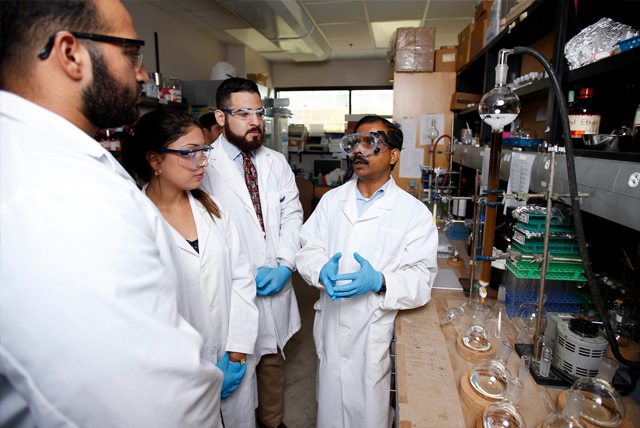Document Type
Article
Publication Date
2-27-2024
Abstract
Dopamine system dysfunction, observed in animal models with psychosis-like symptomatology, can be restored by targeting gamma-aminobutyric acid type A receptors (GABAARs) containing the α5, but not α1, subunit in the ventral hippocampus (vHipp). The reason for this discrepancy in efficacy remains elusive; however, one key difference is that gamma-aminobutyric acid type A receptors containing the α1 subunit (α1GABAARs) are primarily located in the synapse, whereas gamma-aminobutyric acid type A receptors containing the α5 subunit (α5GABAARs) are mostly extrasynaptic. To test whether receptor location is responsible for this difference in efficacy, we injected an siRNA into the vHipp to knock down radixin, a scaffolding protein that holds α5GABAARs in the extrasynaptic space. We then administered GL-II-73, a positive allosteric modulator of α5GABAARs (α5-PAM) known to reverse shock-induced deficits in dopamine system function, to determine if shifting α5GABAARs from the extrasynaptic space to the synapse would prevent the effects of α5-PAM on dopamine system function. As expected, the knockdown of radixin significantly decreased radixin-associated α5GABAARs and increased the proportion of synaptic α5GABAARs, without changing the overall expression of α5GABAARs. Importantly, GL-II-73 was no longer able to modulate dopamine neuron activity in radixin-knockdown rats, indicating that the extrasynaptic localization of α5GABAARs is critical for hippocampal modulation of the dopamine system. These results may have important implications for clinical use of GL-II-73, as periods of high hippocampal activity appear to favor synaptic α5GABAARs; thus, efficacy may be diminished in conditions where aberrant hippocampal activity is present.
Recommended Citation
McCoy, A. M., Prevot, T. D., Mian, M. Y., Sharmin, D., Ahmad, A. N., Cook, J. M., Sibille, E. L., & Lodge, D. J. (2024). Extrasynaptic localization is essential for α5GABAA receptor modulation of dopamine system function. eNeuro, 11(3), ENEURO.0344-23.2023. https://doi.org/10.1523/ENEURO.0344-23.2023
Creative Commons License

This work is licensed under a Creative Commons Attribution 4.0 International License.
Publication Title
eNeuro
DOI
10.1523/ENEURO.0344-23.2023



Comments
Student publication.
Copyright the authors. Immediately upon publication, the work becomes available for the public to copy, distribute, or display under the Creative Commons Attribution 4.0 International (CC BY 4.0) license.